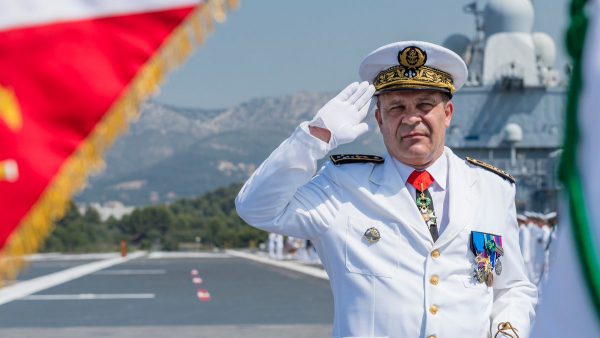France’s increasing naval presence in the Asia–Pacific: ‘We live in the region’

As military cooperation between France and Australia increases, the French Navy is stepping up its presence in the Asia–Pacific region to protect its trade routes and demonstrate the importance it places on international maritime law.
The chief of the French Navy, Admiral Christophe Prazuck, tells The Strategist that the government-to-government agreement for the French company Naval Group to design 12 submarines for the Royal Australian Navy signals much closer cooperation for decades to come.
‘A key reason for our involvement in the region is our new strategic relationship with Australia. We are profoundly linked to the Australian Navy. This contract will link our two countries for decades. For 30, 40, 50 years our links will be tight.’
Prazuck, who served in submarines, on surface warships, as a special forces officer and as an oceanographer, says defence cooperation between France and Australia will be enhanced by the submarine project but it won’t be limited to submarine operations. ‘Our road map is not limited to submarines. It includes environmental surveys, oceanography, hydrography.’
There’s already increasingly close cooperation on anti-submarine warfare, submarine strategy and amphibious operations and more visits to Australian ports by French warships, Prazuck says. ‘We’re sending to Australia our newest class of ships. In the past such visits have been made by patrol boats arriving from France’s island territories. Now we are sending here our most sophisticated pieces of equipment to work with our Australian friends.’
France has always had a strong interest in the Asia–Pacific, Prazuck says. ‘The centre of gravity of the world is moving towards your region. Much of our trade is now with Asia and the Indo-Pacific. We’re not so far from home because we have 1.6 million French people living in the Pacific, in New Caledonia, Polynesia and expats in the area. So we are a country of the Pacific region. We live in the region’, he says.
‘Your region of the world is pretty dynamic’, Prazuck says. ‘Each country in the region is getting the tools it needs to protect its security and prosperity.’ He says France is closely following the tensions in the South China Sea. France is concerned that the international court ruling on the disputed territories has been ignored. ‘This is of great concern to us. We are following it with great attention.’
France is translating those concerns into actions by increasing its naval presence in the area, Prazuck says.
‘What’s happening in the region with the weakening of the law of the sea is important to us. We have been sailing in the area and particularly in the disputed areas to make our point as a maritime country.’
The most recent French defence white paper raises two key security concerns, Prazuck says. The first is the opportunities provided to terrorists when governance collapses and nations become failed states. The other is the extent to which global and regional powers are increasing their arsenals, especially at sea.
‘The strategic landscape is moving rapidly’, Prazuck says. ‘China, for example, built in the last four years the equivalent of the entire French Navy. It’s not a threat, but the landscape has changed and it’s changing very fast. It’s changing faster at sea than on land. With freedom of navigation you can move your assets more easily. You can show your power more easily and you can put pressure on the sea lines of communication and have a strong influence without moving out of your country.’
A more recently emerged threat is North Korea.
Admiral Prazuck now has an Australian officer, a captain, on his staff in Paris to help build the relationship. ‘Having an Australian officer 20 metres from my office will help me to have better interaction with the Australian Navy’, he says. ‘I have a British officer, an American officer, a German officer and an Australian officer. Our four main partners.’
The French military has regularly worked closely with Australian and New Zealand forces to deal with natural disasters in the region.
Prazuck says France needs a strong naval capability because it’s the world’s number two maritime nation with the second largest exclusive economic zone (EEZ). ‘Australia is the third. If you add all the EEZs around our islands, we have 11 million square kilometres—the equivalent of the US and Mexico. It’s a huge piece of water.’
He says that, as a former submariner, he’s sure the conventionally powered Shortfin Barracuda being designed for the RAN will be a very effective submarine that will meet Australia’s needs. ‘I have no doubt about that.’
The question of whether Australia should have nuclear submarines is a political and strategic issue rather than a technical issue, he says.
He says France has been building submarines at the rate of one per year, on average, since 1899. Last year France’s six nuclear-powered attack submarines spent a total of 1,000 days at sea, the highest availability rate since they were launched 30 years ago.
‘We have great confidence in Naval Group’s ability to build the submarines we need and to maintain them’, Prazuck says.